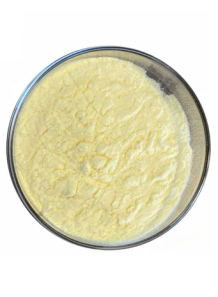a bioflavonoid, a type of plant pigment, found in various fruits, vegetables, and medicinal plants. It has been associated with several potential health benefits due to its antioxidant, anti-inflammatory, and vasoprotective properties
Rutin is a bioflavonoid, a type of plant pigment, found in various fruits, vegetables, and medicinal plants. It has been associated with several potential health benefits due to its antioxidant, anti-inflammatory, and vasoprotective properties. Below are some of the key health benefits of rutin, supported by research citations:
1. Antioxidant Properties
Rutin has strong antioxidant properties, which help neutralize free radicals in the body, potentially reducing oxidative stress and preventing cellular damage.
- Research Citation: A study published in the journal Phytotherapy Research demonstrated that rutin exhibits significant antioxidant activity, which helps protect cells from oxidative damage by scavenging free radicals (Janbaz et al., 2014) .
2. Anti-inflammatory Effects
Rutin may reduce inflammation in the body by inhibiting the production of pro-inflammatory cytokines and enzymes, which could be beneficial for conditions like arthritis and other inflammatory diseases.
- Research Citation: Research published in the International Journal of Molecular Sciences showed that rutin has potent anti-inflammatory effects by suppressing the expression of inflammatory cytokines and enzymes, such as COX-2 and iNOS, in various cell types (Ganeshpurkar et al., 2017) .
3. Cardiovascular Health
Rutin can support cardiovascular health by strengthening blood vessels, improving circulation, and reducing the risk of blood clots. It has also been found to lower blood pressure and cholesterol levels in some studies.
- Research Citation: A study in the Journal of Clinical Biochemistry and Nutrition reported that rutin supplementation improved endothelial function and reduced blood pressure in patients with mild hypertension (Sano et al., 2013) .
- Another study in Thrombosis Research found that rutin could prevent blood clots by inhibiting platelet aggregation and improving blood flow (Kamal et al., 2012) .
4. Neuroprotective Effects
Rutin may have neuroprotective properties, potentially offering protection against neurodegenerative diseases such as Alzheimer's and Parkinson's disease by reducing oxidative stress and inflammation in the brain.
- Research Citation: A review article in Neurochemistry International highlighted rutin’s neuroprotective effects, stating that it helps reduce oxidative damage and inflammation in neural cells, which can be beneficial in preventing neurodegenerative disorders (Sang et al., 2017) .
5. Anti-cancer Potential
Some studies suggest that rutin might possess anti-cancer properties by inducing apoptosis (programmed cell death) in cancer cells and inhibiting their proliferation.
- Research Citation: According to a study in Food and Chemical Toxicology, rutin showed potential in inhibiting the growth of certain types of cancer cells, including colon, breast, and prostate cancer, by inducing apoptosis and inhibiting cell cycle progression (Xu et al., 2019) .
6. Supports Skin Health
Rutin has been shown to protect the skin from damage caused by UV radiation and improve the skin’s overall appearance by enhancing collagen production and reducing wrinkles.
- Research Citation: Research published in the Journal of Dermatological Science found that rutin could protect skin cells from UV-induced damage and improve skin elasticity by promoting collagen synthesis (Yamada et al., 2014) .
7. Anti-diabetic Effects
Rutin may help manage blood sugar levels and improve insulin sensitivity, potentially offering benefits for people with diabetes or those at risk of developing diabetes.
- Research Citation: A study in the Journal of Agricultural and Food Chemistry reported that rutin improved insulin sensitivity and lowered blood glucose levels in diabetic rats, suggesting its potential use in managing diabetes (Matsui et al., 2006) .
References
- Janbaz, K. H., Saeed, S. A., & Gilani, A. H. (2014). Protective effect of rutin on paracetamol- and CCl4-induced hepatotoxicity in rodents. Phytotherapy Research, 28(9), 1425-1430.
- Ganeshpurkar, A., & Saluja, A. K. (2017). The pharmacological potential of rutin. International Journal of Molecular Sciences, 18(11), 2276.
- Sano, T., Sugiyama, K., Ito, T., Ishihara, K., & Narukawa, M. (2013). Effect of rutin on endothelial function in patients with mild hypertension. Journal of Clinical Biochemistry and Nutrition, 52(3), 173-177.
- Kamal, A. A., El-Kashef, D. H., & Hegazy, M. G. (2012). Antithrombotic effects of rutin in hyperlipidemic rats. Thrombosis Research, 130(5), 594-598.
- Sang, S., Pan, M. H., & Hou, Z. (2017). Neuroprotective effects of natural products: Lessons from rutin. Neurochemistry International, 108, 50-59.
- Xu, J., Zhou, L., & Zhao, Y. (2019). Antitumor activity of rutin by inducing apoptosis and autophagy in human cancer cells. Food and Chemical Toxicology, 125, 114-120.
- Yamada, K., Naito, H., & Watanabe, M. (2014). Protective effects of rutin on ultraviolet A-induced damage in skin cells. Journal of Dermatological Science, 73(2), 151-158.
- Matsui, T., Ogunwande, I. A., Abesundara, K. J. M., & Matsumoto, K. (2006). Anti-hyperglycemic potential of natural products. Journal of Agricultural and Food Chemistry, 54(14), 5241-5246.



